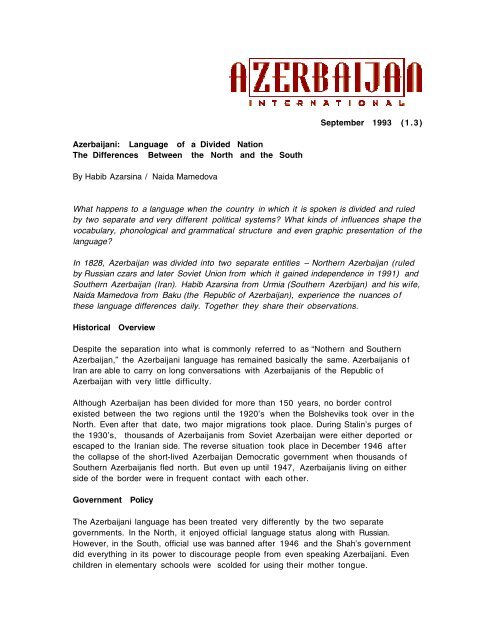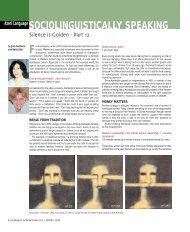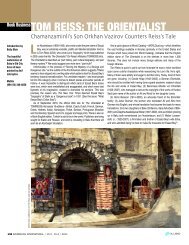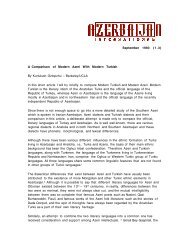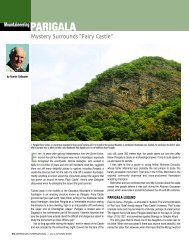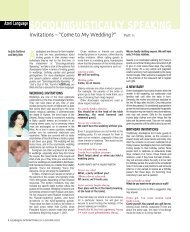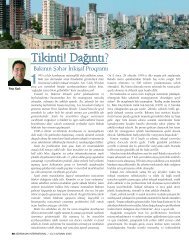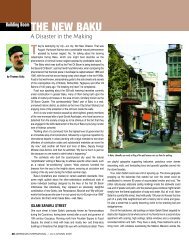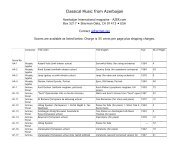September 1993 (1.3) Azerbaijani: Language of a Divided Nation ...
September 1993 (1.3) Azerbaijani: Language of a Divided Nation ...
September 1993 (1.3) Azerbaijani: Language of a Divided Nation ...
You also want an ePaper? Increase the reach of your titles
YUMPU automatically turns print PDFs into web optimized ePapers that Google loves.
<strong>Azerbaijani</strong>: <strong>Language</strong> <strong>of</strong> a <strong>Divided</strong> <strong>Nation</strong><br />
The Differences Between the North and the South<br />
By Habib Azarsina / Naida Mamedova<br />
<strong>September</strong> <strong>1993</strong> (<strong>1.3</strong>)<br />
What happens to a language when the country in which it is spoken is divided and ruled<br />
by two separate and very different political systems? What kinds <strong>of</strong> influences shape the<br />
vocabulary, phonological and grammatical structure and even graphic presentation <strong>of</strong> the<br />
language?<br />
In 1828, Azerbaijan was divided into two separate entities – Northern Azerbaijan (ruled<br />
by Russian czars and later Soviet Union from which it gained independence in 1991) and<br />
Southern Azerbaijan (Iran). Habib Azarsina from Urmia (Southern Azerbijan) and his wife,<br />
Naida Mamedova from Baku (the Republic <strong>of</strong> Azerbaijan), experience the nuances <strong>of</strong><br />
these language differences daily. Together they share their observations.<br />
Historical Overview<br />
Despite the separation into what is commonly referred to as “Nothern and Southern<br />
Azerbaijan,” the <strong>Azerbaijani</strong> language has remained basically the same. <strong>Azerbaijani</strong>s <strong>of</strong><br />
Iran are able to carry on long conversations with <strong>Azerbaijani</strong>s <strong>of</strong> the Republic <strong>of</strong><br />
Azerbaijan with very little difficulty.<br />
Although Azerbaijan has been divided for more than 150 years, no border control<br />
existed between the two regions until the 1920’s when the Bolsheviks took over in the<br />
North. Even after that date, two major migrations took place. During Stalin’s purges <strong>of</strong><br />
the 1930’s, thousands <strong>of</strong> <strong>Azerbaijani</strong>s from Soviet Azerbaijan were either deported or<br />
escaped to the Iranian side. The reverse situation took place in December 1946 after<br />
the collapse <strong>of</strong> the short-lived Azerbaijan Democratic government when thousands <strong>of</strong><br />
Southern <strong>Azerbaijani</strong>s fled north. But even up until 1947, <strong>Azerbaijani</strong>s living on either<br />
side <strong>of</strong> the border were in frequent contact with each other.<br />
Government Policy<br />
The <strong>Azerbaijani</strong> language has been treated very differently by the two separate<br />
governments. In the North, it enjoyed <strong>of</strong>ficial language status along with Russian.<br />
However, in the South, <strong>of</strong>ficial use was banned after 1946 and the Shah’s government<br />
did everything in its power to discourage people from even speaking <strong>Azerbaijani</strong>. Even<br />
children in elementary schools were scolded for using their mother tongue.
Despite these pressures, <strong>Azerbaijani</strong> in Iran survived simply from the sheer number <strong>of</strong><br />
native <strong>Azerbaijani</strong> speakers (one third <strong>of</strong> Iran’s population – approximately 20 million<br />
people). It was only natural, however, that the language would begin to incorporate<br />
many words and even some grammatical features <strong>of</strong> the more prestigious national<br />
language, Persian.<br />
In contrast, in Northern Azerbaijan (population 7 million) under the Soviet regime,<br />
thousands <strong>of</strong> books, magazines and daily newspapers were published despite the fact<br />
that <strong>Azerbaijani</strong> was always under the shadow <strong>of</strong> the more prestigious Russian<br />
language. <strong>Azerbaijani</strong>s who knew Russian always qualified for better jobs and advanced<br />
more rapidly.<br />
In Southern Azerbaijan very few avenues <strong>of</strong> media were available in the native language.<br />
One exception was a single radio program which consisted <strong>of</strong> a one hour governmentsponsored<br />
program. There were no TV programs, no movies, and very few books.<br />
Therefore, many Southerners tuned in to Baku radio or listened to pirate radio stations;<br />
and intellectuals occasionally found ways to get books that were published in <strong>Azerbaijani</strong><br />
(Arabic script) from the North (Progress Press-Moscow; and Yazichi Press-Baku).<br />
Written Form<br />
Considerable differences lie in the written forms <strong>of</strong> the language in the two regions. In<br />
tne South, <strong>Azerbaijani</strong> has survived more as an spoken language rather than a written<br />
one as it is rarely written or published. Consequently, when it comes to writing, most<br />
Iranian <strong>Azerbaijani</strong>s, no matter how highly educated, simply cannot read and write<br />
<strong>Azerbaijani</strong>.<br />
However the Pahlavi dynasty is not fully to blame for the differences. Under the Soviet<br />
regime, Azerbaijan’s alphabet script was changed three times – from Arabic, with its<br />
right to left orientaion, to Latin during the decade between the late 20s and 30s and<br />
finally to Cyrillic form 1940 up until 1991. Very few Iranian <strong>Azerbaijani</strong>s were able t o<br />
read Cyrillic. Apart from the script, the differences in written forms are basically<br />
superficial and most cariations have emerged during the last 50 years. The language<br />
and style <strong>of</strong> books written before 1 940s are almost identical. For instance, poems <strong>of</strong> the<br />
famous Southern poet, Mirza Ali Mo’jis Shabestari are widely read in the North while<br />
poems <strong>of</strong> the Northern poet, Mirza Alakbar Sabir, are widely circulated in the South.<br />
The Future<br />
With the collapse <strong>of</strong> the Shah’s regime in Iran and the disintegration <strong>of</strong> the Soviet Union,<br />
contacts have increased significantly between <strong>Azerbaijani</strong>s. Weekly flights connect<br />
Tehran and Tabriz to Baku; daily bus service exists, and relatives and business people<br />
cross the border frequently. Telephone communication is available, and audio and video<br />
tapes are widely shared.<br />
The Republic <strong>of</strong> Azerbaijan’s decision to adopt a modified Latin alphabet will make i t<br />
easier for Iranian <strong>Azerbaijani</strong>s to read than Cyrillic, as educated Iranian <strong>Azerbaijani</strong>s have<br />
studied English and other foreign languages at school and are familiar with the Latin
alphabet. Many have traveled to Turkey or have studied there and are familiar with the<br />
Turkish alphabet which is closely related to the new one that Azerbaijan is using. Iranian<br />
<strong>Azerbaijani</strong>s need only spend a few hours., or, at most, a few days to master the new<br />
script. Therefore, it is inevitable that once publishing in the new script becomes regular<br />
in the North, a significant exchange <strong>of</strong> ideas between the <strong>Azerbaijani</strong>s <strong>of</strong> the North and<br />
South will occur.<br />
Some Vocabulary Differences between Northern and Southern<br />
<strong>Azerbaijani</strong><br />
English Southern Azerbaijan Northern Azerbaijan<br />
table miz stol<br />
chair swndwl stul<br />
bench nimkwt skamya<br />
bicycle [wrx, d^[wrxw velosiped<br />
driver ]<strong>of</strong>er, ranwndw s^r^c^<br />
intersection [aharrah tin<br />
newspaper ruznamw qwzet<br />
university dani]qah universitet<br />
number ]umarw n=mrw<br />
pen xutqar ru[ka<br />
purse kif sumka<br />
skirt wtwk yupka<br />
necktie kravat qalstuk<br />
army wrte] ordu<br />
soldier swrbaz wsgwr<br />
general swrhwng palkovnik<br />
helicopter helikopter vertolyot<br />
nurse pwrwstar ]wfqwt bac\s\<br />
veteinarian dampizi]k baytar<br />
elections intixabat se[kilwr<br />
minister vwzir nazir<br />
meeting cwlwsw iclas<br />
break twnwff^s fasilw<br />
secretary mun]i katibw<br />
salary h^quq maa]<br />
announcer quywndw diktor<br />
listener e]idwn dinlwyici<br />
to take photos wks salmaq ]wkil [wkmwk<br />
tooth paste xwmir dwndan di] pastas\<br />
electricity bwrq elektrik, i]\q


